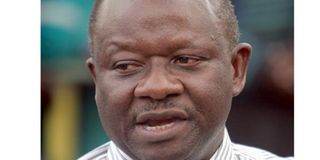Ondego replaced as RVR boss

Former RVR chief executive Brown Ondego. Photo|FILE
What you need to know:
- It is understood that one section of the board has been pressing for Mr Ondego’s ouster from the helmsmanship of the company.
- The shareholders have now agreed to a compromise where even after stepping down as chief executive, Mr Ondego will still serve as executive vice chairman of the board under a complex corporate governance structure.
- After several false starts, RVR under Mr Ondego recently rolled out a massive capex programme, which it says will reduce the 1,400 kilometre journey between Mombasa and Kampala to seven days by June next year.
The Rift Valley Railways board has replaced its chief executive Brown Ondego with Brazillian national Dala De David.
On Tuesday, Mr Ondego and Mr De David signed the circular announcing the new changes, reflecting an overlap of executive functions and a delicate power sharing arrangement that RVR shareholders have crafted.
The board is contracted by Kenya and Uganda to run the 1,400 kilometre line between Mombasa and Kampala under a 25-year concession.
It is understood that one section of the board has been pressing for Mr Ondego’s ouster from the helmsmanship of the company.
The development reflects simmering boardroom strife between major shareholders of the company; Egyptian private equity fund Citadel, Transcentury Ltd and Ugandan shareholder Bomi Holdings Ltd.
Citadel, with a 51 per cent stake, is the largest shareholder followed by Transcentury with 34 per cent and Bomi Ltd, 15 per cent.
The shareholders have now agreed to a compromise where even after stepping down as chief executive, Mr Ondego will still serve as executive vice chairman of the board under a complex corporate governance structure.
Speaking to the Nation, Citadel spokesman Karim Sadeka said Mr Ondego would retain full executive functions of dealing with intergovernmental relations, interactions with Kenya Railways Corporation and broad issues of strategy, while the new CEO will concentrate on actual operations and marketing.
After several false starts, RVR under Mr Ondego recently rolled out a massive capex programme, which it says will reduce the 1,400 kilometre journey between Mombasa and Kampala to seven days by June next year.
The company is putting in a total of $23 million in reforming the dilapidated metre gauge track, the first such major investment in twenty years.
In addition, the company is putting in $26 million in rehabilitating wagons and overhauling locomotives.
Mr Ondego had said that if RVR could increase the speeds of the train, cut down on accidents, and reduce journey days, it could grow volumes fast.
Annual transportable traffic at the Mombasa port is at 20 million tonnes per annum and growing at a rate of 8 per cent. Currently, RVR carries only four per cent of traffic from Mombasa, the rest being transported upcountry by trucks.
The predictions right now are that the business of carrying bulk traffic will expand exponentially following discovery of oil and coal in Kenya and Uganda.
Under the capex programme, RVR is replacing 70 kilometres of curves and bends between Mombasa and Nairobi with new rails imported from China.
The Mombasa and Nairobi section of the railway line is critical to RVR’s operations because of the volume of transportable traffic in this section and the fact that 90 per cent of accidents and derailments on the line happen between Mombasa and Nairobi.
On the Ugandan side, activity is focused on the complete rebuilding of culverts between Busembatia and Jinja, some of which were at the point of collapsing.
It remains to be seen how the ouster of Mr Ondego from the driving seat will affect the ambitious capex program.




